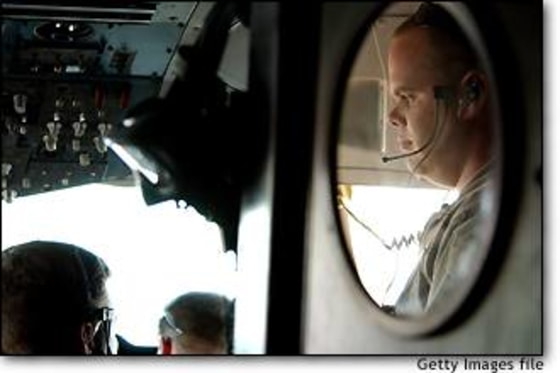Of the 33 nondescript warehouses that make up this U.S. outpost in the Persian Gulf, one holds the key to a successful military campaign against Saddam Hussein. Should President Bush give the order to attack Iraq, one of the drab buildings at Camp As Saliyah will be transformed instantly into the central command of all U.S. forces in the region.
For the last several years, Camp As Saliyah has served primarily as a military depot for U.S. operations in the gulf, and most recently as a staging area for American troops fighting the war on terrorism, mainly in Afghanistan.
With little fanfare six months ago, the United States began preparing to turn the collection of Wal-Mart sized warehouses into a home away from home for the U.S. Central Command based in Tampa, Fla. From a perch in the Persian Gulf, U.S. Army Gen. Tommy Franks will be able to command an air, land and sea invasion of Iraq.
The deal to move to the region was formalized with the government of Qatar — a tiny sheikdom on a thumb-shaped peninsula on the gulf — in December by U.S. Secretary of Defense Donald Rumsfeld. Franks inaugurated the facility the same month, staging a simulated battle with the state-of-the-art technology that has replaced the tanks and heavy armor that once filled the dozens of warehouses at Camp As Saliyah.
Franks gave the base’s “mobile command center” his seal of approval and headed back to Tampa, leaving behind a skeleton staff to maintain the high-speed data links and banks of computers and giant monitors that will come to life in the event of a war with Iraq. Already, senior central command officials are returning to the region to be prepared for war, should Bush give the go-ahead.
MISSION CHANGE
Aware that their current routines at As Saliyah could change overnight, U.S. troops here say they are working hard to break the monotony of their duties while U.N. weapons inspectors search Iraq for weapons of mass destruction and Bush weighs action against Baghdad.
“There are lots of long hours trying to keep this place safe,” said Corp. Clay Carrington of Texas. “We try to break it up by rotating around to other areas to keep from getting bored. We make sure that nothing gets old or that we miss anything we should be paying attention to.”
Some 800 troops at the base are supporting the central command mission and its staff. But as Washington increases its troops in the region by tens of thousands over the next month, battle strategists are heading to Qatar. Camp As Saliyah’s population will surge to more than 2,000 if war comes.
Some 4,000 U.S. troops are currently stationed in Qatar at several facilities, including As Saliyah. Less than 10 miles down the road, F-15E Strike Eagle fighters are deploying to a base the United States shares with the Qatari air force. Al Udeid has the longest runway in the Middle East, a prized asset for action against Iraq. The Strike Eagles, fighters capable of air-to-air and air-to-ground combat, share runway space with massive midair refueling tankers. At Qatar’s international airport, the U.S. military also operates a small logistics base.
QATAR’S SUPPORT
Qatar’s readiness to support U.S. action against Iraq is in contrast to its large neighbor, Saudi Arabia. As Bush initially sought to build support for ousting Saddam, the Saudis wavered in their commitment to Washington to use the Prince Sultan airbase as central command headquarters. After negotiations stalled last year, Qatar was chosen for the command.
That decision has reverberated at As Saliyah ever since. Many of the warehouses are being subdivided to house more soldiers, commanders and the press corps covering the conflict.
For Pvt. Auvery Callahan, a 19-year-old native Missourian, the drums of war can be heard in the pounding of the hammers of construction workers readying the base for a conflict. Between her shifts as a receptionist at the camp medical tent, Callahan says she tries to comfort herself.
“I have something to write in. And I have a Bible. You’ve got to have faith in something,” she said.
(MSNBC.com’s Preston Mendenhall is on assignment in the Persian Gulf. )
